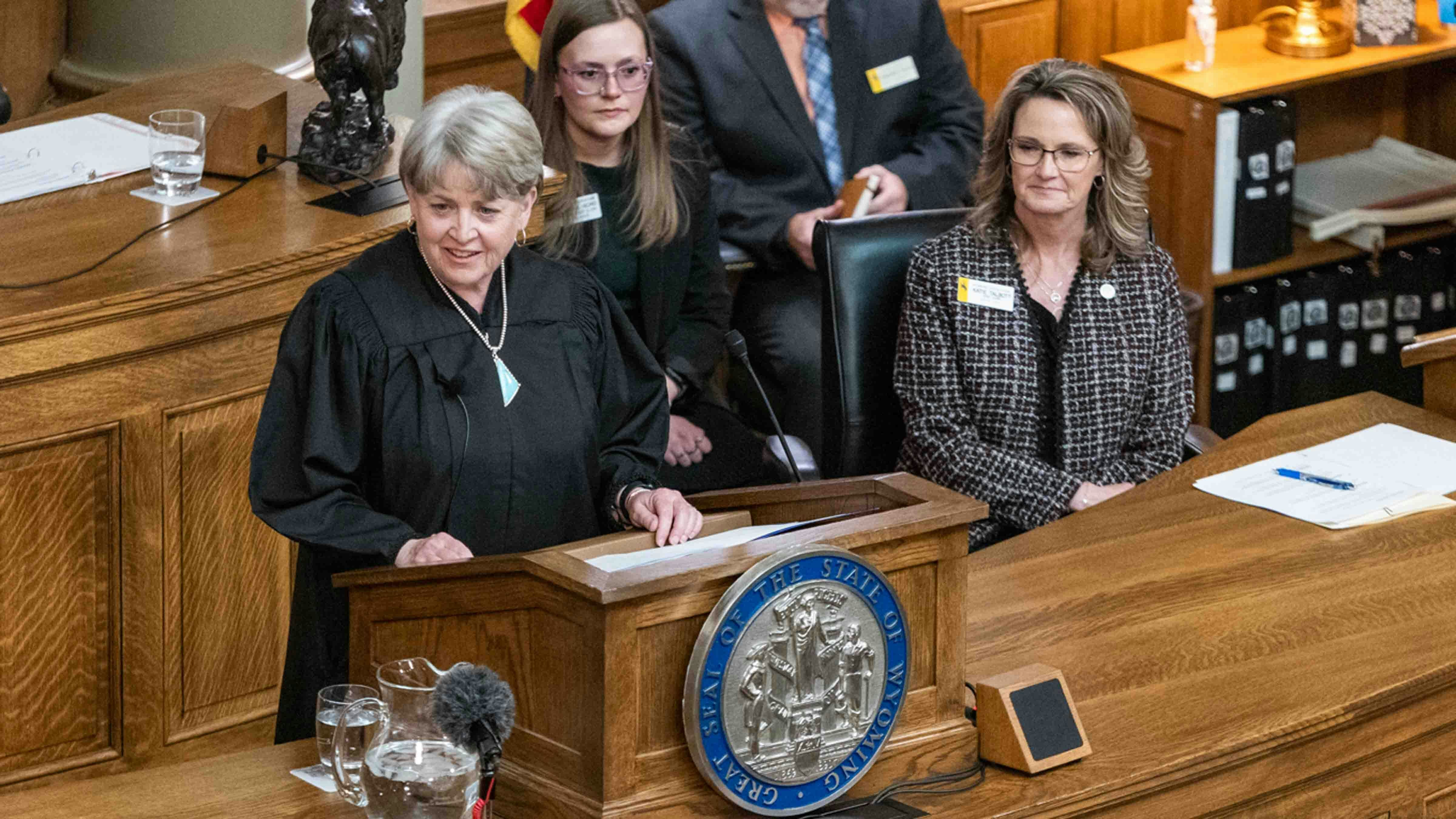A Cheyenne-based judge on Tuesday paused Wyoming’s school-choice program during the course of the case against it – which could be months or years.
Laramie County District Court Judge Peter Froelicher granted the Wyoming Education Association’s request for a preliminary injunction, in its case against state Superintendent of Public Instruction Megan Degenfelder and state Treasurer Curt Meier.
This is a stronger, longer-lasting version of the temporary restraining order the judge issued in late June. The temporary restraining order acted like a pause button to let Froelicher weigh for two weeks whether he was going to issue this preliminary injunction.
Nine parents are also suing the state officials with the WEA.
The public education advocacy group sued in June, to block the Steamboat Legacy Scholarship program from going into effect. Passed by the legislature in differing degrees in 2024 and 2025, the program would have placed money in public funds per student into state-contractor-held accounts for qualifying students, to use for private school or homeschool as an alternative to public school.
The school-choice program offers up to $7,000 in public money to students seeking alternate schooling on a first-come, first-served basis from a $50 million pot comprised of appropriations from two years.
Froelicher’s preliminary injunction does not finalize the case, but it marks a victory for the WEA, by blocking the school-choice program during the group’s legal challenge.
It also amounts to a judicial ruling that WEA is likely to win its case and that the program may be harmful.
“This is a crucial step in protecting our constitutional promise of a free, fair, and equitable public education for every Wyoming student,” wrote WEA in a Tuesday-evening statement. “This win belongs to our members, our students, and our communities. We still have work ahead of us, and we will continue to fight for our students, our school, and our future.”
Disheartened
Degenfelder in an overnight statement said she’s disheartened at the court's order.
“As one of nearly 4,000 Wyoming families, you have had your lives unnecessarily upended through no fault of your own,” she wrote to the families that have been approved for the payouts. “This constitutional dispute could have been handled in a different way to not cause such harm to you.”
Degenfelder is working with the Wyoming Attorney General’s office on ways to challenge the injunction, she wrote, adding, “We will continue to keep you apprised of the situation, and I will continue to fight for school choice in Wyoming.”
Of the families that have applied for the grants, 3,809 had been approved as of June 27, according to the Wyoming Department of Education.
Absolute Control Of The State
In judging that WEA is likely to win in its assertions that the program violates the Wyoming Constitution, Froelicher first focused on Article 3, section 36 of that document.
It bars the legislature from appropriating money for educational or benevolent purposes to any person or entity “not under the absolute control of the state.”
That the money filters through the superintendent’s office does not dodge this problem, Froelicher wrote, adding that the Wyoming Supreme Court has rejected pass-through reasoning like that.
“There is no dispute that the Act appropriates funds for educational purposes to persons who are not under the absolute control of the state,” the judge wrote. “Neither the parents, the students, nor the Certified (education) Providers are under the absolute control of the state.”
The Absolute Right
Froelicher judged a likelihood of success for WEA in another area: he determined that the program may violate the fundamental right to an equitable education the Wyoming Constitution promises.
The Wyoming Attorney General’s Office (defending the state) and a group of parents intervening to help defend the program argued that the program does not affect a child’s right to a proper education – because it’s a separate offering.
“The Court disagrees,” wrote Froelicher. “The Act allows parents, on behalf of their school-aged children, to use public funds to educate their children in a manner which does not necessarily provide the constitutionally mandated equal opportunity to a complete and uniform, thorough and efficient, and quality education open to all.”
Had it been allowed to go into effect, the program would have allowed private schools to operate under different standards than public schools. Private schools are also free of many federal requirements, the plaintiffs noted in their arguments.
The state asserted that the program is born of a “compelling governmental interest” of providing school choice when some statewide test scores have been dropping; and that the program is narrowly tailored toward that end.
Those assertions were worded to clear a constitutional challenge of the new law.
Froelicher rejected that attempt, saying the program doesn’t overcome constitutional limits on it.
“The Act sets a very simple bare minimum standard for (its vendors) of ensuring each student… receives instruction” on various topics, wrote the judge.
Irreparable Injury
WEA and its coalition also proved to Froelicher they’re likely to suffer under the law, the judge ruled.
WEA pointed to its century-long advocacy for public schools.
The parents pointed to their public-school-attending children’s various disabilities and claimed private schools could reject them or treat them differently based on those. Some of the parents asserted that they have gender-nonconforming or gay children, also, who could be rejected by private schools and therefore disadvantaged under the act.
The state had rebutted these claims, writing in a filing this month that the parents don’t express any interest in their pleadings, in switching to private school, and so can’t rightly claim they’re being marginalized by private schools.
Some of the parents are also public-school educators. The plaintiffs have claimed that the program could harm schools financially.
The state countered that by noting that attendance quantities are a large factor in Wyoming school funding, so decreases in school districts’ money would be proportionate to their workload.
These assertions aren’t enough to bear the risk of letting the state dole out money in a way that will violate Wyomingites’ right to a free public education, Froelicher wrote.
Appropriating millions of dollars for private school scholarships “is inconsistent with the undisputed doctrine that (the legislature’s) paramount priority is to support ‘an opportunity for a complete, proper, quality education,’” wrote the judge. “And any competing priorities that are not of constitutional magnitude are secondary.”
Lastly, Froelicher wrote that blocking the payouts – as he has done – maintains the state’s status quo while the case is ongoing.
Editor’s note - this story has been updated to include an overnight statement by Superintendent of Public Instruction Megan Degenfelder.
Clair McFarland can be reached at clair@cowboystatedaily.com.





